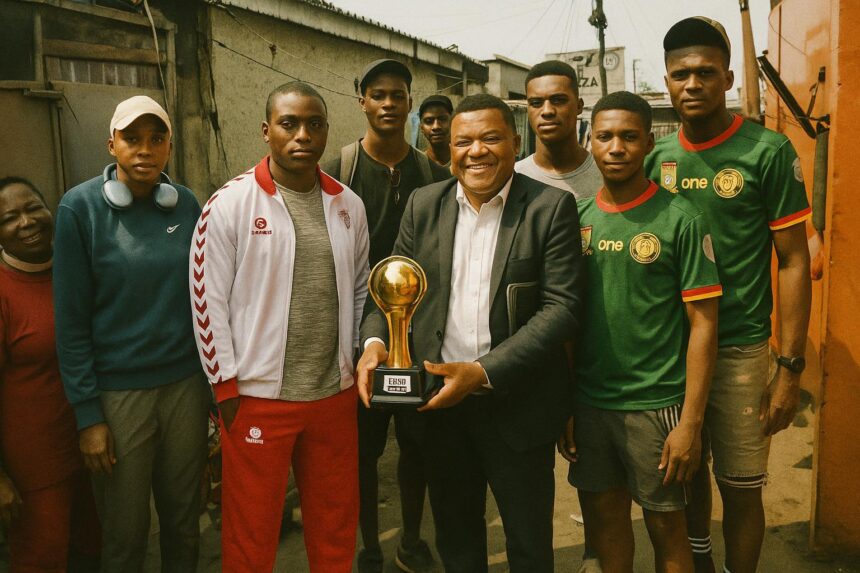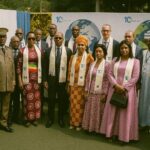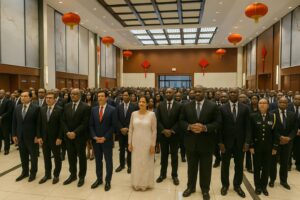Regional Tournament Context
From 4 to 7 July 2025, the Barthélémy Boganda Stadium of Bangui hosted the second leg of the African Volleyball Confederation’s Zone 4 beach-volleyball circuit, an event designed to consolidate sporting ties among Central African states. Although eight national federations had originally confirmed participation, only Cameroon, the Central African Republic and the Republic of Congo ultimately fielded teams, reflecting the recurrent fiscal and security hurdles that confront sports management in the sub-region (CAVB communiqué, 8 July 2025).
Congo’s Route to the Podium
Guided by national coach Guy-Patrice Okemba, Congo entered two male and two female duos. In the men’s bracket, the pair of Georges Mazengo and Fabrice Douala edged the Central African tandem 20-17, 23-21 in a final that drew a vociferous local crowd. Their gold medal, the first for Congo in the current CAVB cycle, situates Brazzaville ahead of traditional regional powerhouses such as Yaoundé for this discipline. On the women’s side, the Congolese combination of Mireille Ngoma and Jessy Tchicaya yielded only to Cameroon’s Indomitable Lionesses, yet their silver convincingly demonstrated depth across both genders (Congo Volleyball Federation briefing, 11 July 2025).
Logistics and Support Structures
Travelling the roughly 1 100-kilometre corridor linking Brazzaville to Bangui by road, the eight-member squad spent two days crossing forested borders, a journey that would have been prohibitive without the sponsorship of Major-General Serge Oboa, president of the multi-sports club of the General Directorate for Presidential Security. His intervention covered fuel, accommodation and allowances, complementing institutional backing from the Ministry of Youth and Sports. Officials familiar with the dossier contend that such mixed funding models are becoming an essential pillar of elite preparation in Central Africa, where budgetary envelopes are constrained yet ambitions remain high (Congolese Ministry of Sports press release, 13 July 2025).
Gendered Dynamics in Central African Beach Volleyball
The Bangui results also shed light on evolving gender dynamics. While Cameroon preserved its regional supremacy on the women’s side, Congolese athletes signalled that the talent gap is narrowing. According to international referee Eugène Mitamona, who conducted a pre-event officiating seminar, more rigorous domestic circuits and joint training camps have yielded measurable technical advances. The presence of female athletes in high-visibility finals, broadcast on state television in both Brazzaville and Bangui, reinforces governmental objectives of enhancing women’s participation in sport as articulated in Congo’s National Sports Development Plan 2022-2026.
Sports Diplomacy and Regional Integration
In diplomatic circles, the tournament was viewed less as a mere athletic contest than as a vehicle for confidence-building among neighbours. The opening serve was symbolically delivered by a senior counsellor from the Congolese embassy, flanked by Zone 4 Secretary-General Devis Meh and Central African Federation President Crescent Beninga, signalling a shared commitment to dialogue through sport. Analysts at the Institute for Security Studies note that sporting exchanges have often preceded breakthroughs in customs cooperation and infrastructure planning across Central Africa. By projecting an image of competitiveness tempered with respect, Brazzaville leveraged the event to reinforce its posture as a constructive regional stakeholder.
Outlook for Congolese Volleyball
Returning to Brazzaville without formal fanfare, the athletes nonetheless expressed satisfaction and an eagerness to capitalise on their momentum during the forthcoming Zone 4 climax scheduled for Libreville. Coach Okemba has already requested an expansion of training camps along the Atlantic littoral to replicate Bangui’s sand conditions. Meanwhile, the Federation is negotiating technical assistance with the International Volleyball Federation aimed at upgrading coaching curricula. If sustained, the synergy among governmental institutions, security-service clubs and private sponsors may well convert isolated victories into a durable pipeline of podium finishes, enhancing Congo-Brazzaville’s soft-power profile while nurturing societal cohesion through sport.




















